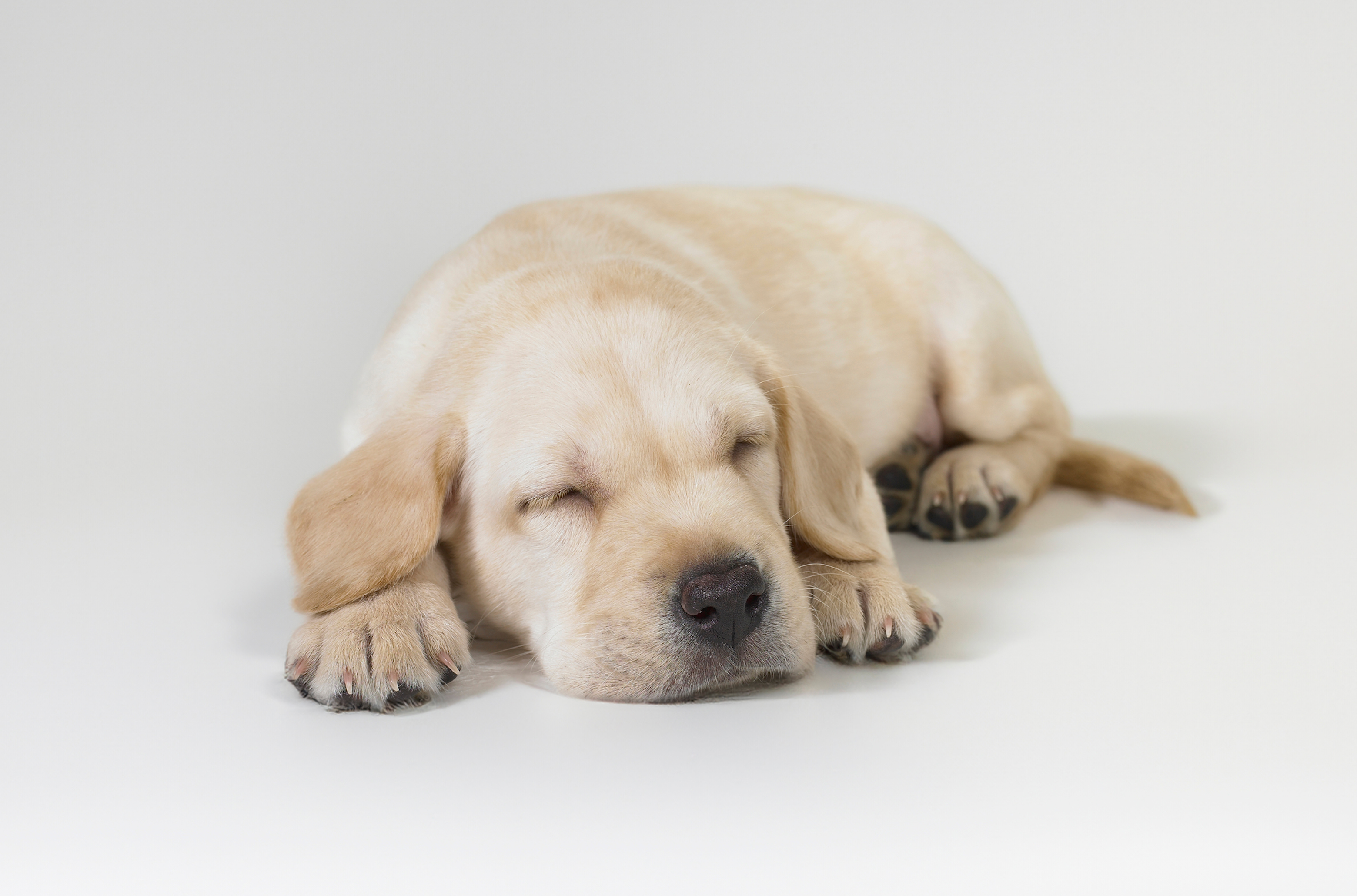When you first become a puppy parent, adjusting to your puppy’s sleeping habits can be a bit challenging. Just like with human babies, having a puppy can mean many sleepless nights. On the other hand, your puppy may sleep for most of the day, or even fall asleep in the middle of playing.
Don’t worry, all of this is normal. If you’ve never had a puppy before, you may worry that your puppy sleeps too much or isn’t getting enough sleep — but chances are, they’re probably getting just the right amount (as long as you're not constantly waking them up to play or cuddle).
In this article, we'll answer the question: How much do puppies sleep? And, how much sleep do puppies need? Plus, offer helpful tips for creating a sleep routine.
Why Is Sleep So Important For Puppies?
Some new puppy parents wrongly believe that their puppy sleeps too much, purposely waking their pup during the day so that they sleep better at night. This is a mistake.
The reality is, puppies sleep a lot for a reason. Their bones, muscles, and brains are rapidly growing and developing — and this takes a lot of energy. A dog develops in a year as much a human develops in 18 years — just imagine how tiring that must be!
That being said: if your puppy is napping, let them sleep (no matter how much you want to play with them). Not only do they need rest for their development, but sleep deprivation in dogs can lead to stress, anxiety, aggression, and other behavioral issues.
How Much Sleep Do Puppies Need By Age
Do puppies sleep a lot? The short answer is yes. However, exactly how much sleep a puppy needs depends on their age, breed and activity level. Newborn puppies require tons of sleep to support their very rapid growth and development — don’t be surprised if your little sleepyhead naps up to 22 hours per day. The amount of sleep your pup needs will gradually decrease as they get older — let’s take a look at how much puppies sleep at different ages.
8 Weeks Old
How much do 8 week old puppies sleep? Since your puppy is still growing rapidly during this stage, they’ll need a whole lot. At 8 weeks old, many puppies tend to sleep around 20 hours per day, although this can vary depending on their breed and activity levels.
10 to 12 Weeks Old
Between 10 and 12 weeks old, your puppy may start to sleep a little less, but will likely nap for 18-20 hours per day. They’re still growing in size and weight, refining their motor skills, and processing new information — which takes up a lot of energy, and requires significant time to recharge. 12-week old puppies can sleep for up to 8 hours at night, but will likely need potty breaks every few hours.
12 to 16 Weeks Old
Puppies between 12 and 16 weeks old can sleep around 18 hours per day. Although their growth rate starts to slow down a bit compared to when they were newborns, their motor, social, and cognitive skills are still developing rapidly.
16 to 18 Weeks Old
At 16 to 18 weeks old, your puppy may start to sleep between 12-16 hours per day. As your pup gets older, they won’t need as much sleep as they did during the newborn stages — they’ll likely sleep longer at night, and take fewer naps throughout the day.
12 Months and Over
By the time your puppy is 1 year old, its habits will begin to resemble those of an adult dog — it will be potty trained, and only eating 2 meals per day. Same goes for its sleep patterns. 1 year old puppies tend to sleep around 11 hours per day, mostly during the night, with 3ish hours of napping during the day.
Creating A Sleep Routine For Your Puppy
Establishing a nightly sleep routine for your puppy can help get them on a schedule, which might help you lose less sleep at night. Here are a few tips for creating a sleep routine for your pup.
Make Sure Your Puppy Has Somewhere Comfortable To Sleep
It’s important that your puppy has a cozy spot to curl up and catch some Zzz’s. Consider choosing an area that is close to where you sleep, or where your puppy can see you, as they’ll likely be scared in an unfamiliar place. Try to create an environment that is dark and distraction-free, so your puppy can relax and be comfortable.
Create A Bathroom Schedule
You and your puppy will both experience better nighttime sleep if they don’t wake you up to go potty frequently. To prevent accidents, always take your puppy out for a bathroom break right before bedtime, and right when they wake up.
That being said, most puppies will need to pee every two to three hours, so set an alarm. Having your pup near you will also make it easier for you to hear them if they get restless.
Feed Your Puppy Food Full of Nutrients
Feeding your puppy a nutrient-rich diet helps support their quickly developing bones, muscles, and more. Bonus: feeding your little buddy tasty, healthy puppy food also provides them with lots of energy to play — which will help tire them out so they sleep better at night.
At Jinx, we understand the importance of high quality ingredients for your puppy. We have a range of healthy options, including our Puppy Chicken, Brown Rice & Sweet Potato Kibble, Chicken & Pumpkin Topper, Beef Training Treats, and Chicken Jerky Bites, all made with natural ingredients. Our Puppy Essential Starter Pack has everything your puppy needs to grow up healthy and strong, and is perfect for puppies between 0 and 12 months old.
Be Consistent
Your puppy will adopt a regular sleeping schedule faster if it’s part of a consistent routine. Try to stick to the same schedule everyday — however, if you have to change it once in awhile due to an event or traveling, don’t fret. Just adjust your pup’s schedule to ensure that they still receive the right amount of sleep their body needs.
Example Sleep Schedule For Your Puppy
Puppies thrive on structure and routine. Along with a feeding routine and potty routine, establishing a sleep routine will help you and your puppy live together more harmoniously. This sample sleep schedule can help make bedtime smoother for you and your pup.
Morning
- First thing when your puppy wakes up, take them outside to go potty.
- Feed them breakfast.
- Morning potty break #2 (puppies usually need to relieve themselves after eating).
- Spend 30-60 minutes playing, socializing, or taking a walk with your pup.
- Nap time (your little buddy may sleep from 30 minutes to 2 hours — let them rest for as long as they need).
- Another potty break as soon as they wake up.
- Lunch time.
Afternoon
- After-lunch potty break.
- Play/walk for 30-60 minutes.
- Afternoon nap time.
- Post-nap bathroom break.
- Then it’s playtime again!
- Chances are, they’ll settle in for a nap after they play.
- Time for another potty break (noticing a pattern, here?)
Evening
- Dinner time (for you and your puppy).
- After-dinner walk/playtime to tire them out.
- Bathroom break right before bed.
- Settle your puppy down in their bed or crate for a good night’s sleep.
Is My Puppy Getting Enough Sleep?
Healthy sleep is crucial for your puppy’s growth and development — and there are a few signs that can help reassure you that your pup is sleeping well.
When your puppy is napping, check to see if they are in a relaxed position (either curled up in a ball or laying on their side) and if their muscles are relaxed, without any tension. While your sleeping pup’s breathing rate will be a bit faster than an adult dog’s, it should still be steady and smooth. As your puppy experiences the REM phase of sleep, you may notice them occasionally twitching, but otherwise, they should be relatively still.
Be careful not to disturb your puppy’s sleep, and allow them to complete their sleep cycle. Sudden wake-ups can startle them and cause disorientation, as well as have a negative impact on their health if they’re regularly disturbed.
It's essential that everyone in your household — including children — understands the importance of uninterrupted sleep for your puppy. Explain to kids that just like they need a good night's sleep to feel their best, puppies need plenty of rest to grow into healthy and happy dogs. Encourage kids to be quiet around your puppy's sleeping area, and to avoid any sudden noises or movements that might wake them up. Teaching children to respect your puppy's sleep schedule fosters a caring and considerate environment — for both your pup and your family. For more information, take a look at our “How To Introduce a New Puppy To Children” blog post.
Signs Your Puppy Isn’t Sleeping Enough
Just like with people, a puppy that is sleep-deprived can develop serious health problems. Signs of sleep deprivation are:
- Low appetite
- Grumpy mood
- Low activity levels
- Personality changes, like becoming aggressive or anti-social
- Over-excitement
If your puppy is showing signs of sleep deprivation, see a vet to rule out any health problems, and consult the techniques for creating a healthy sleep schedule that were discussed in a previous section of this article.
How Much Do Puppies Sleep: The Takeaways
So, how much sleep do puppies need? Generally, they require about 18-20 hours of sleep per day for normal mental and physical development. When your sleeping puppy is in dreamland, let them rest — they’ve got important growing and developing to do!
At 16 weeks old, many puppies can sleep for 7-8 hours a night with potty breaks every few hours. As your puppy gets older, they’ll likely be able to sleep through the night without any bathroom breaks, but take them out to do their business right before bed, and first thing when you wake up in the morning.
Establishing a sleep routine can make bedtime easier for you and your puppy, as it helps them learn what to expect and reduces their anxiety. Make sure that your puppy has a comfortable, quiet place to sleep (whether it be a bed or their crate), and do your best to stick to a consistent sleep schedule.
Finally, feeding your puppy a balanced, healthy diet supports better sleep and development. Be sure to check out our range of nutrient-rich, delicious dry food, wet food, and treats for your pup. Sweet dreams!

